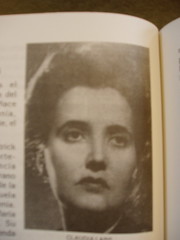Here’s yet another section from my anthology! Enjoy. The poem about the rose is kind of naughty – just thought I’d point that out in case you’re not naturally dirty-minded.
Emilia Bernal (1884-1964)
Emilia Bernal de Agüero was born in Cuba, and lived in Ecuador, Perú, Bolivia, Chile, and New York. She was married young and had four children before 1908. She taught college literature. In 1909 she separated from her husband, and began publishing in 1910. After her divorce, she joined the Cuban diplomatic staff. She was known as a rebel, non-conformist, and political writer (Vega Ceballos). She wrote for La Nación, Bohemia, Social, and El Fígaro (Biblioteca Virtual Miguel de Cervantes).
The Basque writer Llorenç Villalonga, author of the play Silvia Ocampo (1935), wrote the novel Fedre and the first part of Madame Dillon based on his relationship with Bernal (Pomar).

Henríquez Ureña mentions Bernal as a modernist and follower of Martí in his history of modernismo. Emilia Bernal translated from Catalan, Portuguese, and other languages into Spanish; her translation work includes a book of poems by Rosalia del Castro.
Her publications include: Alma Errante, poems (1916); Cómo los pájaros! poems and translations (1923); Layka Froyka, autobiography (1925); Los nuevos motivos, 1925; Exaltación (1934); Poetas catalanes de hoy, translations (1927); Cuestiones cubanas para América, political essays, (1928); and Negro (1938).
Though her work is often spoken of as personal, modernista, or lyrical, Bernal was engaged in politics for much of her life and read a series of lectures in Spain, Portugal, and elsewhere on Cuban and United States politics (Davies 22). Along with many other feminists such as María Luisa Milanés, she allied herself with anti-racist movements and described herself as a sister-in-arms of enslaved people – going so far as to declare that all women were slaves because of the lack of female suffrage and other factors (Davies 57).
Anderson-Imbert said of her: “Tender, ardent, intuitive, was capable of denying these qualities in herself in order to complicate sounds which brought her close to a poetry which, under the heading ‘abnormality’ will be studied in the second part of this panorama. Those who remain, then, are Cubans of the ‘abnormality’–Mariano Brull, Navarro Luna, and others . . .” (337). What Anderson-Imbert calls “the abnormality” is the “vanguardist subversion” against modernismo.
Bernal is noticably absent from many biographical dictionaries of Latin American writers.
“Pedrería” plays with modernista color symbolism; the gems represent ideals of perfect beauty. Rather than setting a scene of fantasy to which the soul of the poet is transported, or a situation of transmutation to a plane of ideals, Bernal engages sensually and physically with the perfect beauty of the gems. “A una rosa” (1916) is a poem in sexta rima with a scandalous subtext: the rose and its stalk are limp and drooping, while the poet wishes and imagines that her efforts will make it stand erect again. “Hierro” is from the México chapter of Bernal’s 1937 book América. There is an earlier version of the poem from 1925, but I have not yet found it. In “Hierro,” Bernal ventures into the realm of free verse and presents a vision of industrialization, and Mexico, as boldly but perturbingly masculine.
Pedrería
Ámbar. Mármol. Zafir. La algarabía
de un cofre de fakir. Que se aproveche
de tanto encanto mi osadía. Eche
a revolver en él la mano mía.
Alabastro y azur. Sangre del día.
Piedras a granel. Rosas de leche.
Carcajadas de luz. Mi afán estreche
y agite la ofuscante pedrería.
Mar. Cielo. ¡Sol, entre mis brazos!
¡Fuego
de los claros diamantes con que juego!
Malquitas, topacios. ¡Serpentinas
de centelleos en mis manos! ¡Presas
en los dedos guirnaldas de turquesas,
lapislázuli, jade, aguas marinas!
Jewels
Amber. Marble. Sapphire. The jingling babble
of magic treasure. May my bold desires
make the most of such enchantment. Let me
stir them around with my hand.
Alabaster and azure. Day's blood.
Stones in a heap. Roses made of milk.
Great laughter of light. My longing grasps
and tumbles the precious jewels.
Sea. Sky. Sun in my arms!
Fire
of bright diamonds playing!
Malachite, topaz. Serpentine ribbons
sparkling in my hands! Caught
in my fingers, wreaths of turquoise,
lapis lazuli, jade, aquamarine!
A una rosa
O rosa, ¡rosa mía! que ayer lozana fuiste,
por qué doblas ahora lacia, debil y triste,
tus pétalos marchitos, tu cáliz sin verdor.
¿Le cuentas a la tierra tus dulces remembranzas
como en largo secreto sus muertas esperanzas
la moribunda virgen le cuenta al confesor?
Pensando en lo que fuiste y al ver cómo feneces,
quisiera alzar el tallo en donde languideces,
tornarte la frescura, la belleza, el color,
volverte en un suspiro tu aliento perfumado,
acercarte mis labios y a un beso prolongado
prender en ti, de nuevo, suavísimo el calor.
To a rose
Oh rose, rose of mine! that once sprang sprightly up,
why do you bend double, flaccid, weak and sad,
your petals withered, your once-green calyx pale?
Do you tell the earth the sweetness of your past,
like the long secret story of dead hopes
a dying virgin whispers to her priest?
Thinking on what was was, and to see how you decline,
I'd wish to raise the stalk on which you languish,
to give fresh strength to you; beauty, color;
to return, with a sigh, your perfumed breath
to bring you to my lips and in a long, long kiss
press upon you new, most softly, heat and fire.
Hierro
¡Un hombre de hierro!
De hierro las carnes del pecho invencible.
De hierro los bíceps y tríceps del brazo que erecta triunfante ademán.
Las manos de hierro y el vientre.
Y los muslos columnas potentes de hierro, y las piernas,
cual zócalos bravos sostenes de aquel formidable titán,
con el pie clavado en la tierra apretando en los dedos de garra
las raíces del árbol que arranca del bíblico Adán
De hierro los ojos.
De hierro los dientes.
De hierro el cerebro, los pulmones y el corazón,
los riñones, el bazo y el sexo.
Por fuera y por dentro un hombre completo de hierro.
¡La fuerza!
La fuerza más grande que el tiempo a la vida ha lanzado
es su encarnación.
Iron
A man of iron!
Iron the flesh of his invincible chest.
Iron his biceps and triceps, his arm raised in triumphant sign.
His hands of iron and his belly.
And his thighs potent columns of iron, and his calves,
brave pedestals sustaining that formidible Titan,
with his foot nailed to the earth, with clawed fingers he seizes
the roots of the tree from the Biblical Adam.
Iron his eyes.
Iron his teeth.
Iron
his brain, his lungs and heart,
his kidneys, spleen, and sex.
Inside and out a man completely made of iron.
Strength!
The greatest strength that time has launched
is his incarnation.









